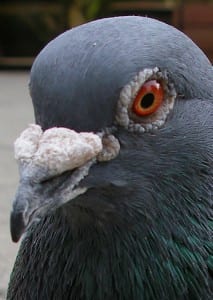When Brits began posting pictures of pink pigeons to social media, the mystery took flight.
Had the rare Columba mayeri, a pink pigeon unique to the small Indian Ocean island Mauritius that belongs to the same family as the dodo and narrowly avoided extinction itself in the 1990s, suddenly migrated to Britain?
Finally, it seems the riddle has been solved, and the conundrum was in fact much ado about nothing.
The baffling birds appear to be the work of one pigeon keeper in Bristol, who dyed the pigeons pink to protect them from predatorsaccording to the area’s local newspaper.
The Bristol Post cites cash-and-carry worker Sher Singh, 39, as the man responsible.
“I put the colour on because the Falcons will get confused,” he told the paper. “He will see the colours but won’t see the pink so well. I didn’t know if the colour for the pigeons was bad. I won’t colour them again . . . I’m sorry for colouring them, it was a mistake.”
Unfortunately, local experts in Ontario, where falcons have been thriving recently, say the man’s logic is flawed on most counts.
The pink dye would not ward off predators, and it may ostracize the birds among their fellow pigeons, according to Marion Nash, 54, vice-president of The Canadian Peregrine Foundation.
“I don’t see how that could possibly work, it’s nonsense,” she said. “Falcons eat all different kinds of coloured birds. They eat red cardinals, so why would they ignore pink birds?”
Nash doesn’t think the dye would necessarily hurt the birds because the feathers are similar to human hair and will moult quickly.
Her organization has even employed a similar practice, albeit for different reasons. The Peregrine Foundation will dye young falcons’ tail feathers to distinguish and protect them when they are learning to fly.
Where it could have an effect is in the pigeons’ relationship with its own kind.
“Pigeons will avoid others if they see them acting strange or sick,” she said. “They’ll wonder what’s wrong and might attack or avoid them.
“It could make the birds more of a target than before, from fellow pigeons or other animals. It could possibly stand out more because of the pink dye and be more of a disadvantage than an advantage.”
By using dye, the Bristol bird lover might have made it more likely his pigeons will die.
About Pigeon Patrol:
Pigeon Patrol Products & Services is the leading manufacturer and distributor of bird deterrent (control) products in Canada. Pigeon Patrol products have solved pest bird problems in industrial, commercial, and residential settings since 2000, by using safe and humane bird deterrents with only bird and animal friendly solutions. At Pigeon Patrol, we manufacture and offer a variety of bird deterrents, ranging from Ultra-flex Bird Spikes with UV protection, Bird Netting, 4-S Gel and the best Ultrasonic and audible sound devices on the market today.
Voted Best Canadian wholesaler for Bird Deterrent products four years in a row.
Contact Info: 1- 877– 4– NO-BIRD (www.pigeonpatrol.ca)


